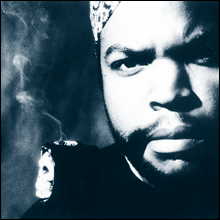![[Sidebar]](/standard/image/sidebar.gif)
![[Music Reviews]](/standard/image/headers/music_reviews_header.gif)
| clubs by night | club directory | bands in town | concerts | hot links | reviews & features |
West meets East
Hip-hopping in Hong Kong
by Josh Kun
Ice Cube
It's rush hour in Hong Kong and I'm in the back of a cab on the way to a bird market where live crickets are stuffed into plastic bags and birds look for a way out of their cages. The driver is a middle-aged father of three and he speaks English -- not the English I speak or the English anyone I know speaks, but the Queen's English, straight from a night-school language tutorial for the newly colonized. His sentences are crisp and formal; his grammar is technical and rigid, robotic and proper as afternoon tea. It's been three years since England released Hong Kong -- Europe's second-to-last Asian colony -- to Chinese rule, but you can still hear the sound of the imperial sun never setting in his voice.His English teacher recently told him that the English he speaks is out of date, that "nobody cares about grammar or sentence structure anymore." When I ask him what kind of English people do care about, he throws a glance into the rear-view mirror and replies, "Ice Cube." And just like that, he went from being a living relic of British rule to being a living relic of a time when English sounded like something other than black English, when global culture didn't mean hip-hop.
It was a pretty startling reminder of the obvious: once a post-industrial Reagonomic-underclass battle cry of racialized have-nots, hip-hop is now bling-bling multinational commerce, a mainstream cash cow exported in the same executive-approved crates as Hollywood fantasy. Once the late 20th century's great anti-American anthem spliced together in capitalism's grim underbelly (Greg Tate dubbed it "inverse capitalism"), hip-hop is now confirmed American product, a capitalism bestseller. In the Hong Kong HMV, Jay-Z's recent album was on display right where it should be, next to the Backstreet Boys and a new screen-to-studio album from Wong Kar-wai film star Tony Leung.
Later that same night, I was at a much-hyped hip-hop club in a towering five-star hotel. The dance floor was packed with expatriate junior financiers and spiffy HK locals. I spotted one local baggy b-boy popping and locking in the corner. The tracks seemed pulled from a "Hip-Hop for Weddings and Bar Mitzvahs" disc: Naughty by Nature, Snoop, Jazzy Jeff, and the Fresh Prince. At least in this one spot, hip-hop was still simply an American import, not a foreign spore that was growing gardens of local organisms.
But I had been listening to two of those organisms all week: the newest Warner Hong Kong release from Hong Kong's premier crew, LMF (which unfortunately stands for Lazymuthafucka), and the solo go of LMF's deft turntablist DJ Tommy -- who's been victorious with his Hong Kong beat cut-ups at many an international mixing showdown. Both albums sound seriously up to the minute: Tommy's textured sampling chops everything from traditional Chinese opera to Rakim one-liners, and the LMF MCs flow the best they can in a Cantonese that makes flow difficult. (I caught an LMF video on a local video show. It was hosted by someone named Jason in an orange football jersey who littered his Cantonese with "yo," "so here we go," and "go out and buy it.")
What you don't see with Chinese hip-hoppers is what you do see in Tokyo: kids with pricy hair extensions, braids, and insta-dreads using skin darkeners to dress up in hip-hop's racial costumes. LMF and Tommy don't mimic the marketed affect and style of MTV ghetto blackness as much as they mimic the affect and style of hip-hop -- and the two aren't always the same thing. LMF and Tommy want to be hip-hop. They don't necessarily want to be black.
That tension was evident at the club. When Warren G's "Regulate" came on, I watched one young girl rhyme along with the song's LBC tales and caught the b-boy in the corner throwing Compton gang signs with the wrong fingers. My first reaction was to cry foul on the basis of my regional affiliation. What do they think they're doing? What do they know about a black rapper like Warren G? About LA? But then I realized the other obvious thing: Hong Kong kids have been fed the same hip-hop I have, as a white kid raised far from any hip-hop-producing black neighborhood. I too nod along with a Dre beat. My shoulders also bounce the way shoulders bounce in videos. And that night, I was dancing right next to them, on the floor of a corporate hotel in a capitalist Asian city on its way back into the People's Republic, on a black planet where the only language that everyone is trying to speak is Ice Cube.
| home page | what's new | search | about the phoenix | feedback |
Copyright © 2000 The Phoenix Media/Communications Group. All rights reserved.
